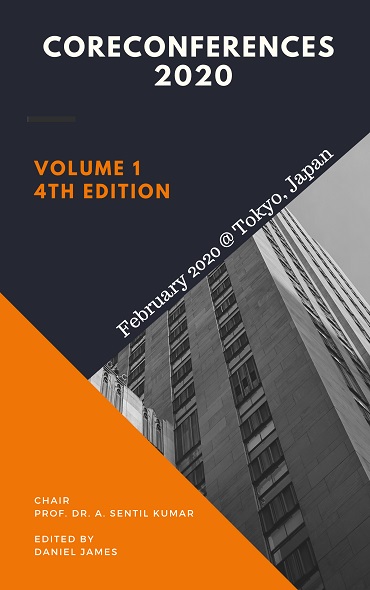- Publication Meta:Value
- Short Title:CC Batch A 2020
- Publisher:ASDF, India
- ISBN 13:978-93-88122-10-8
- ISBN 10:93-88122-10-0
- Language:English
- Type:Hard Bound - Printed Book
- Copyrights:CC Batch A Organizers/DCRC, London, UK
- Editor-in-Chief:Dr A Senthilkumar
- Conference Dates:03 - 04, February 2020
- Venue Country:Tokyo, Japan
- Submitted Papers:259
- Acceptance Rate:8.77%
- Website:www.coreconferences.com
Welcome to ASDF Electronic Digital Library!
CoreConferences 2020
CoreConferences 2020
International Conference on Tourism, Travel and Philosophy 2020
Paper 007
How Green Marketing Influences the Green Behavioral Intentions of Hot Spring Hotel Guests
Kuo-Chien Chang1, Ya-Ti Hsu2, Chu-Jin Hsiao
Abstract
This study applied the stimulus-organism-response (S-O-R) paradigm to investigate the effects of green marketing on the green behavioural intentions of hot spring hotel guests. In so doing, this study explored the mediating roles of green innovation, green image, and green perceived value from a micro-perspective. This study also considered the moderating role of destination trust from a macro-perspective. This study administered surveys to guests of hot spring hotels in the Jiao-Xi township of Taiwan. As shown in Figure 1, the results revealed that green image and green perceived value mediated the relationship between green marketing and green behavioural intention. Among these two variables, green perceived value showed a more significant mediating effect. Therefore, hot spring hotels should aim to improve green perceived value by providing guests with unique and environmentally beneficial services, such as services related to eco-tourism and environmental protection. Hotels may also benefit from adopting green construction materials, energy-efficient lightbulbs, and water-saving faucets. This study further found that, although green marketing positively affects green innovation, green innovation did not mediate the relationship between green marketing and green behavioural intention. This suggests that the innovative green services currently offered by hot spring hotels may not be sufficient to impress hot spring hotel guests. This therefore suggested that hot spring hotels improve guest perceptions of green innovation by providing intimate and convenient services such as fixed-point shuttle bus services, encouraging guests to use public transportation, and by offering bicycle rental services. Finally, as shown in Table 1, this study found that destination trust significantly moderated the relationships among green innovation, green image, green perceived value, and green behavioural intention. Moreover, green innovation affected green behavioural intention more strongly when guests had lower trust in a hot spring destination. Thus, this study inferred that, if guests who do not initially trust a hot spring destination are impressed by the hot spring hotel's innovative green services upon arrival, they will experience cognitive dissonance. This experience pushes them to have self-regulation in mental by increasing the positive cognition of hot spring hotel, which leads to an increase in green behavioural intention. In other words, when guests experience cognitive dissonance, consumers can improve the credibility of the new cognition by changing the behaviour or increasing the cognition consistent with the behaviour, thus replacing the old cognition and obtaining a psychological balance.
Keywords
Author's Profile
Author profile can be generated and linked through our partners World Book of Researchers. To include your profile online Click Here. After it is approved, please email to edlib @ asdf.res.in to create a link with all the papers.
e-AID
2020.CoreConferences.007
Cite this Article as Follows
Kuo-Chien Chang, Ya-Ti Hsu, Chu-Jin Hsiao. How Green Marketing Influences the Green Behavioral Intentions of Hot Spring Hotel Guests. International Conference on Tourism, Travel and Philosophy (2020): 04. Print.
© 2010 - by EDLIB . All rights reserved.

